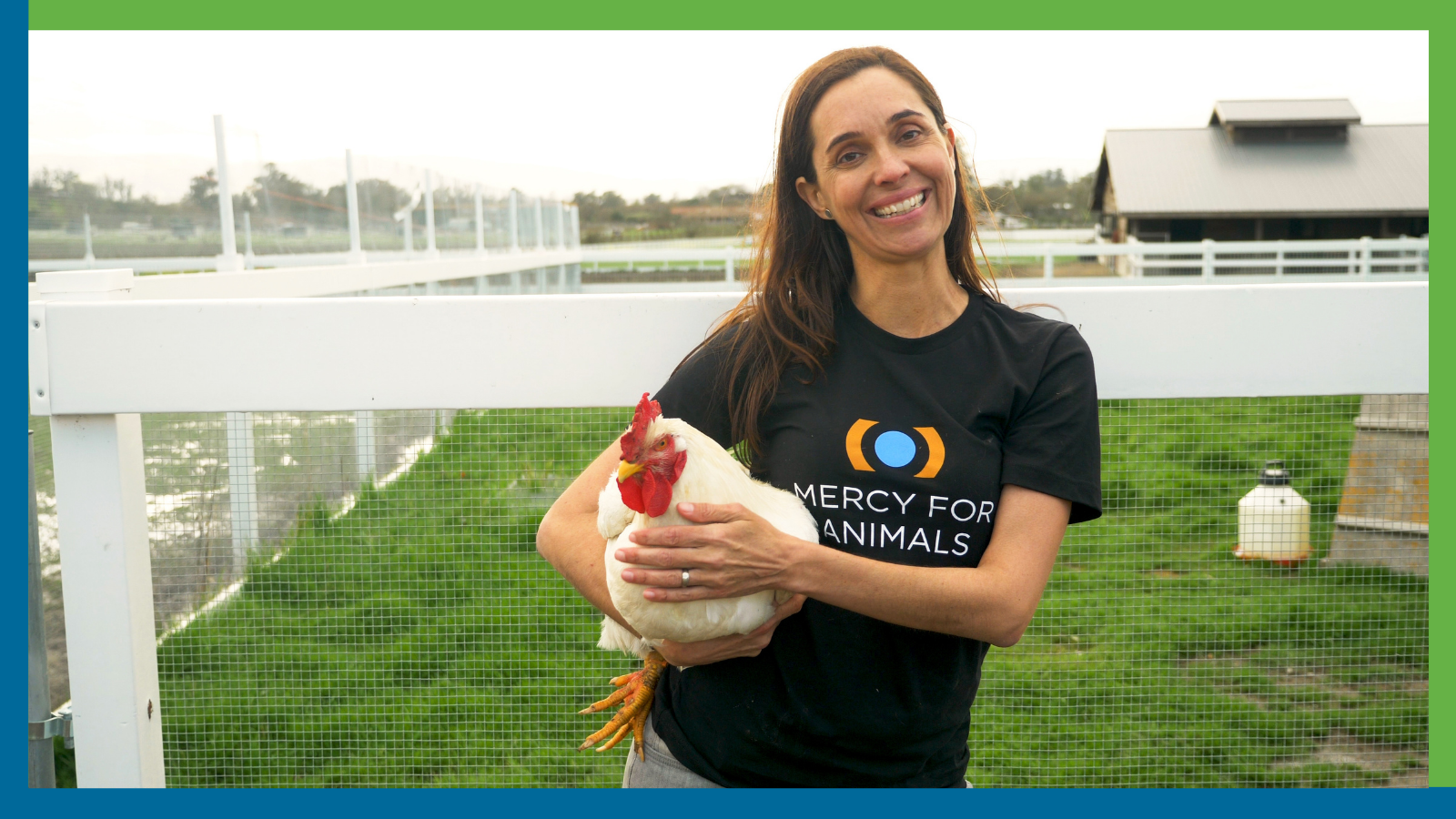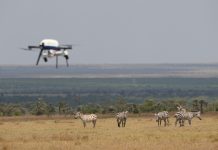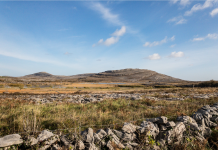In honor of International Women’s Month, The Planetary Press is highlighting women around the globe who are driving positive change for our planet and global community. Today, we are thrilled to introduce you to the President and CEO of Mercy for Animals, Leah Garcés.
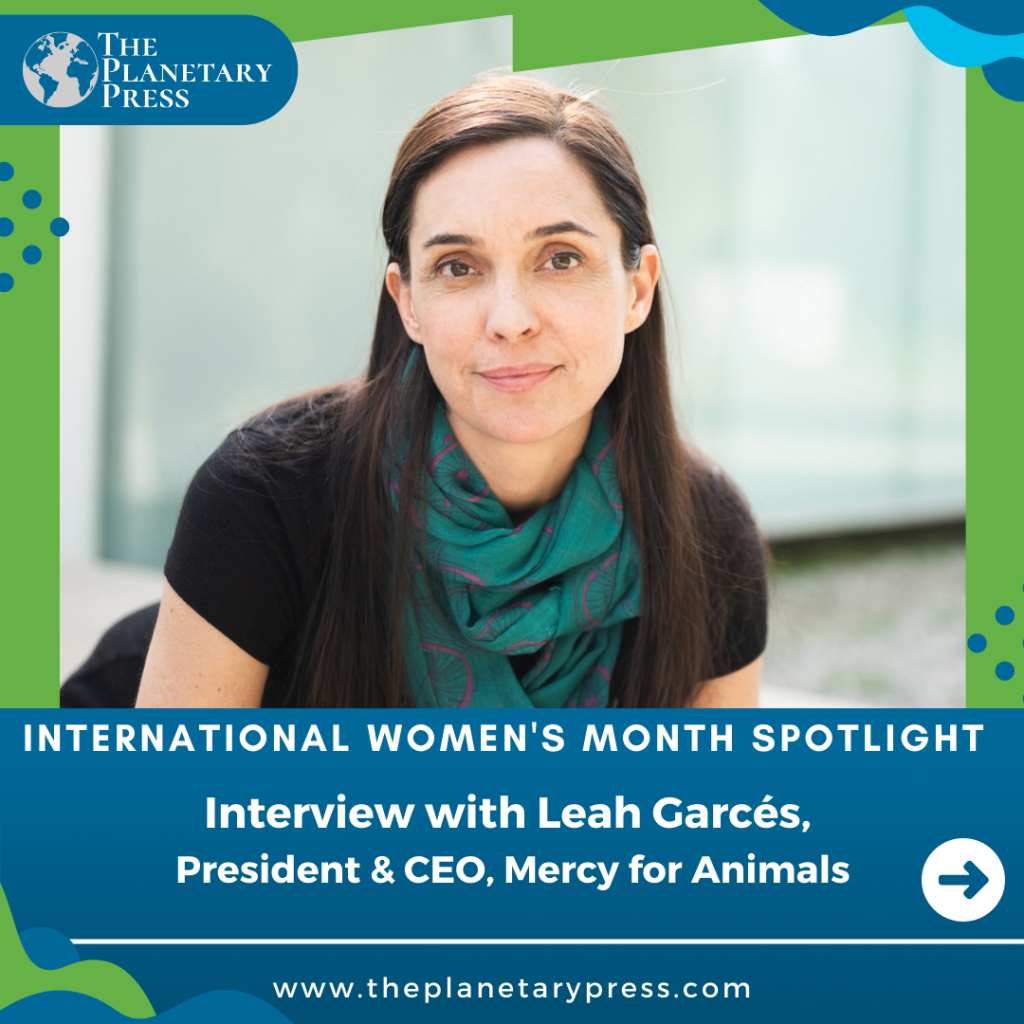
You are a trailblazer in the animal protection movement, helping to improve the conditions of animals and changing the way consumers view animal agriculture. Please tell us more about your background and what led you to dedicate your life to animal rights.
I grew up in the swamps of Florida, watching wild ducks raise their young in my mom’s flower beds. I loved seeing their lives unfold. I grew up with the conviction that these ducks, and all animals, have rich inner lives and could experience joy, love, and families, just like us. When I was a teenager, I saw a documentary about factory farming, and I was deeply upset to realize that, despite my love of animals, I had unknowingly been complacent in their abuse. I went vegetarian and then vegan.
I wanted to protect animals and nature, so I studied zoology with the intention of pursuing a wildlife veterinary career. My mentor at the time was studying the impact of agriculture on wild alligator populations. Runoff from farms was altering their biological sex characteristics and lowering their population. This enlightened me about the impact of agriculture on wild animals.
I read the classic “Silent Spring” by Rachel Carson, which awakened the activist in me. At the end of my degree, my mentor took me aside and said, “Leah, you don’t want to be a vet. Vets are like plumbers. They fix animals once they are already broken. You want to get to the root of the problem.” So I went to London to pursue a Master’s degree in Environment and Development. There, I discovered a professional movement dedicated to animal welfare, and I knew I was where I needed to be.
After my Master’s, I joined a farmed animal welfare organization, and the rest is history. I’ve been working to protect farmed animals ever since. I think my turning point was recognizing that farmed animal welfare was where I could make the biggest impact. It was—and still is— one of the most neglected areas that affect the greatest number of animals and therefore represents a disproportionate amount of animal suffering; I saw that this was the most impactful application of my energy and focused on that for the rest of my career.
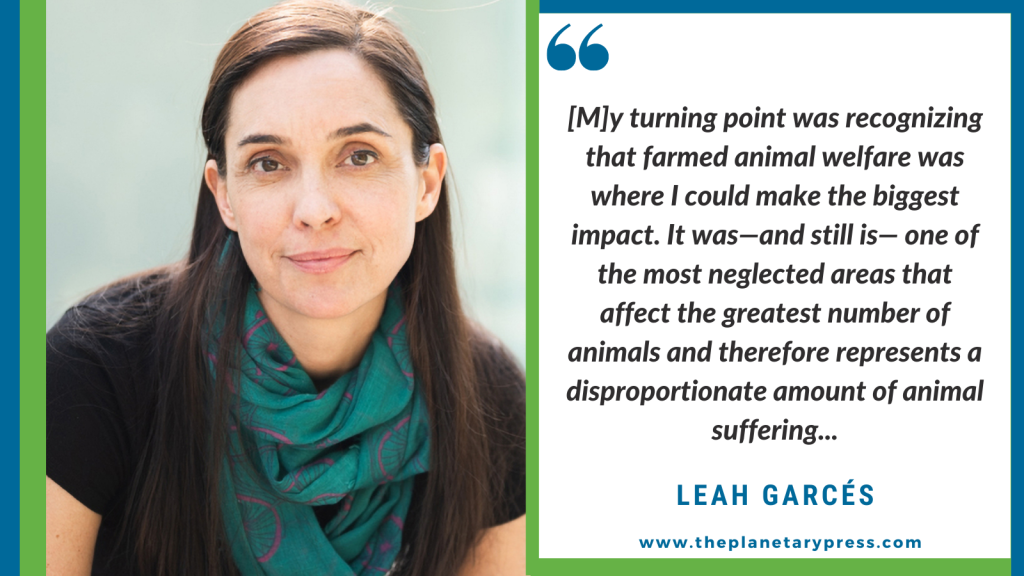
You are the President and CEO of Mercy for Animals. Can you tell us about your work and mission with the organization?
My overall mission is to reduce suffering and increase compassion in the world. And, by far, our greatest opportunity to do so is through eliminating factory farming, so I was proud to join Mercy For Animals in 2018 to drive progress on this vision. We have made incredible strides on our mission and strategic plan since then. Mercy For Animals recognizes that this system not only exploits animals but also oppresses humans and their communities— particularly those most vulnerable— while posing grave health risks and destroying our beautiful planet.
Through corporate and public engagement, undercover investigations, and legal/policy work, we push to end factory farming and build a more just and compassionate food system. We believe this multi-pronged approach is the quickest route to the tipping point. We work to promote plant-based products and other alternatives, discourage the production and consumption of animal products, and improve animal welfare standards.
This work demands our all, and there is always more to be done — so another important part of my mission is to foster an organizational culture of belonging in which everyone feels they can thrive. This means prioritizing equity and inclusion and encouraging every team member to bring their fullest, most authentic self to work. This kind of holistic wellness is an oft-neglected but essential consideration. People do their best work in a supportive, empowering culture — and when we do our best work, we make the biggest impact for animals.
You are the author of “Grilled: Turning Adversaries into Allies to Change the Chicken Industry,” which details your work with the farming sector to find solutions for animal welfare and ethical food. Can you tell us more about the book and your journey “behind enemy lines?”
In the summer of 2014, I found myself sitting across from a man who was supposed to be my enemy — Craig Watts, a factory farmer who raised chickens for slaughter. On the long drive to his house, I had a million questions — among them, why had he really agreed to meet with me? I was convinced I was heading into an ambush. As it turned out, that interaction would change my life and my approach to work in a monumental way.
Craig had been raising chickens for 22 years in factory farms for Perdue, the fourth-largest chicken company in the United States. Craig had searched for a way to stay on the land that had been passed down in his family for five generations in one of the poorest counties in North Carolina. Job opportunities were scarce, so when Perdue came to town and offered him a contract to raise chickens, it sounded like a dream come true. He took out a $250,000 loan from the bank to build the chicken houses. Perdue paid him for each flock he raised. With that money, he paid off the loan, like a mortgage.
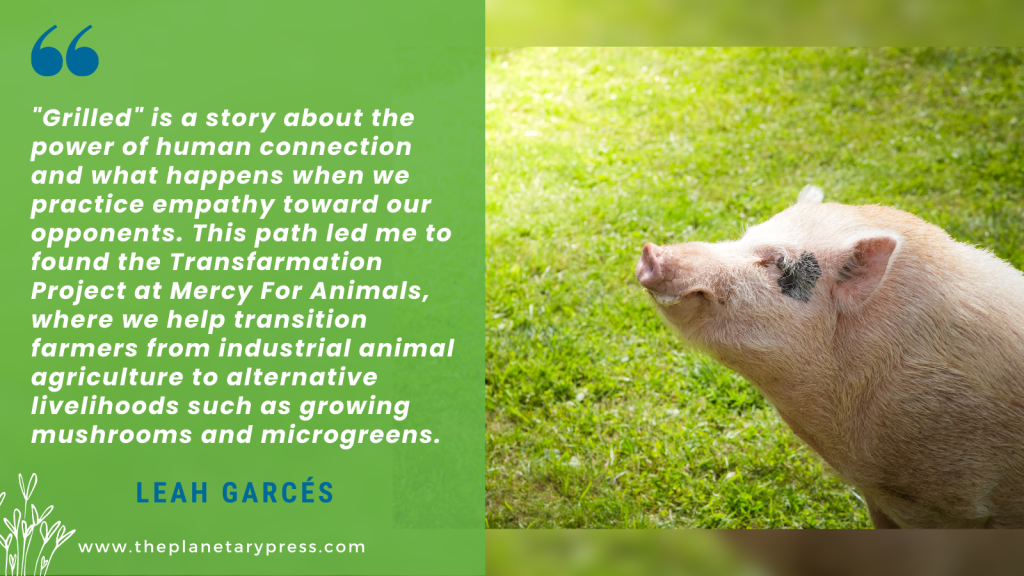
But soon, the chickens started to get sick. When the chickens got sick, they died, and you don’t get paid for dead chickens. Craig started to struggle to pay off his loan. So, while the paychecks got smaller, the bills kept coming, and he soon wanted out. He knew he’d made a mistake. But now, he was all but an indentured servant. If he stopped, he’d risk losing everything. By the time he and I met, he’d reached a breaking point. His payments seemed never-ending, and so did the illness, death, and despair of the chickens.
It’s so easy to hate someone you’ve never met. It never occurred to me that this man felt as trapped as his chickens. We ended up telling his story in The New York Times, and in 24 hours, a million people had seen our video. Our unlikely alliance put the truth of factory farming on a global platform. Teaming up with Craig got me thinking: what other unlikely allies are out there? This started me on a new path toward exploring what is possible when we dare to cross “enemy lines.” This is the premise of “Grilled” and, in my mind, an important consideration when we’re prioritizing progress for animals.
“Grilled” is a story about the power of human connection and what happens when we practice empathy toward our opponents. This path led me to found the Transfarmation Project at Mercy For Animals, where we help transition farmers from industrial animal agriculture to alternative livelihoods such as growing mushrooms and microgreens. My forthcoming book features the Transfarmation Project in an exploration of how we transition to a just and sustainable food system – look for that in the Fall of 2024!
You have more than two decades of leadership experience in the animal protection movement. What have been some of the most rewarding experiences thus far?
Craig’s and my story in the New York Times was definitely a highlight for me. This was the product of a tremendous effort that demanded so much of our team — but its impact was apparent and profound. We were flooded with comments from people from all walks of life, including folks for whom this had been eye-opening, a total revelation.
In 2020, while working with a Transfarmation farmer, I had the opportunity to rescue a chicken who we named Henrietta. The year my family spent with her was one of the most rewarding of our lives.
Working with farmers like Craig and our other Transfarmation farmers has been humbling and inspiring and taught me unforgettable lessons about the power of collaboration. Writing the book on the Transfarmation Project has been fulfilling beyond measure.
I could go on and on. From witnessing the historic passage of the first resolution on animal welfare at the United Nations Environment Assembly (UNEA) to the emotional rollercoaster of California’s groundbreaking Proposition 12 legislation for farmed animals and its subsequent challenge by the pork industry in the U.S. Supreme Court, I have been honored to be a part of these and many more profound moments in animal welfare history.
Given your expertise, what are the biggest challenges to ending factory farming, and how can consumers help drive and support efforts to reform our food system in a way that is ethical, inclusive, and environmentally sustainable?
One of the biggest challenges is simply the sheer number of humans on the planet and the fact that, even as people become more mindful of their food choices and many are even inclined to eat less meat, there are more people in the world every day, so, just by the numbers, humans are eating more animals than ever. This is compounded by the fact that the harms and costs of the industry are largely disguised from consumers and externalized — in other words, displaced onto third parties, like the animals, farmers, and the communities that house factory farms. I talked about this in a recent conversation with Ezra Klein on his New York Times podcast.
In this abuse of power, the industry obscures these costs to the point that people only see the price at the register or on the menu— so something that seems “affordable” is artificially so, at great cost to our communities, our health, the animals, and the planet— everyone but the very industry responsible. Foods that aren’t subsidized in this way are not accessible to a great many people, so we have the dual duty of driving prices for plant-based alternatives down while driving the price of animal products up, closer to what it should be.
Finally, the industry relies on false, idyllic imagery of happy animals on family farms to assuage consumers about where their animal products come from. We have the tall order of changing this narrative to reflect the reality of what becomes of animals in this system.
Consumers can help effect change by reducing their consumption of animal products to whatever extent is within their means— and seeing the money they do have to spend as a way of voting for what they want more of, which includes supporting plant-based businesses and organizations, especially those owned by people of marginalized identities.
Another way to help is to lobby your legislators. Your elected officials work for you, and asking them to represent your interests is a powerful way to make change for farmed animals.
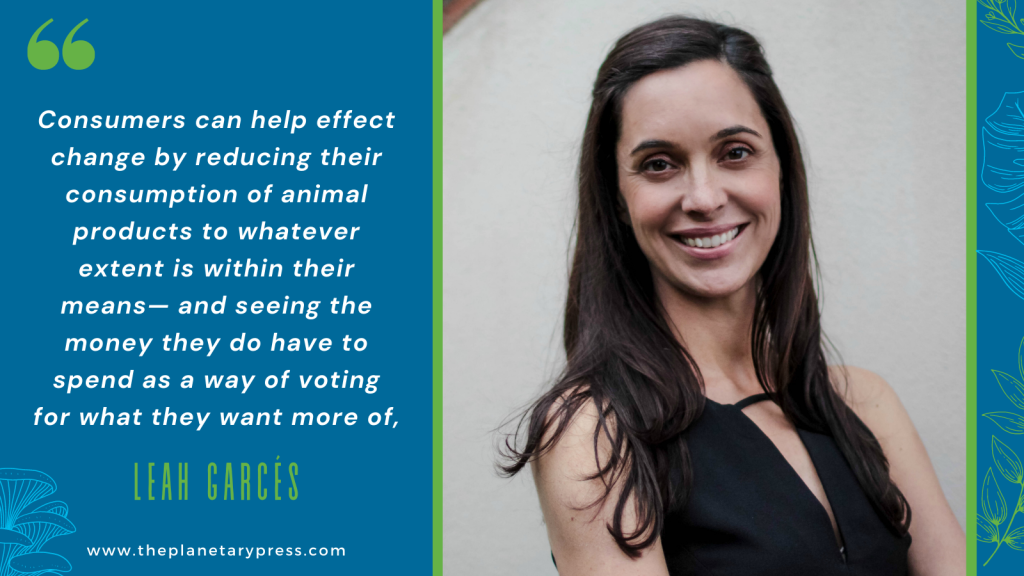
In recent years, we have seen an increase in headlines about farmers shifting away from meat and dairy production to plant-based agriculture. Can we expect more of this, and what advice do you have for farmers looking to move away from animal agriculture and toward alternative proteins?
As you might be able to tell from my enthusiasm about our Transfarmation Project, the short answer is YES, and I think this is one of the most promising paths forward. This strategy dignifies the livelihoods of hardworking farmers, many of whom have been victimized by the very industry we are up against; a constructive approach is critical to transforming our food system. If we truly want to create change for animals, we can’t stand on the sidelines and point out what is wrong. We have to roll up our sleeves, build the solutions, and find the win-wins.
The plant-based food industry is expected to be worth $85 billion by 2030. To get there, plant-based food producers will need a reliable source of key ingredients, such as peas, mushrooms, oats, and greens. There has never been a better time to make this change. The Transfarmation Project seeks to empower thousands of farmers to transition to plant-based agriculture—and in doing so, ignite a global movement to transform our food system into something better for everyone.
The project supports farmers’ transitions and seeks to create replicable models for other farmers and legislative progress to lay the groundwork for great systemic change. My advice to farmers would be that it is possible, and our Transfarmation farmers are living proof. I encourage those interested to get in touch and stay tuned for my forthcoming book in 2024.
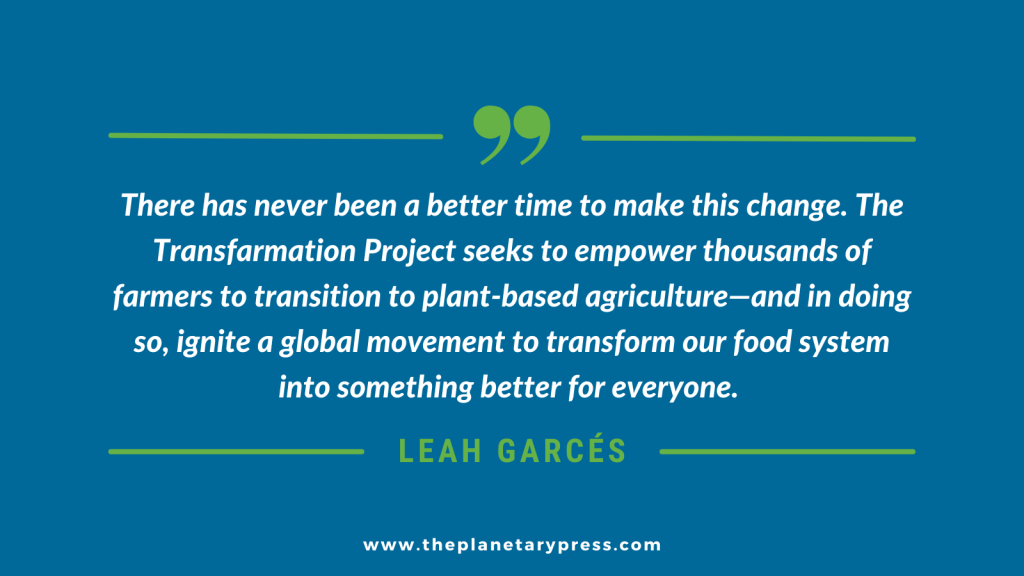
How can people get involved with and support the vital work of Mercy for Animals?
We are a non-profit, and we rely on contributions from our incredible donors to fund the crucial work we do for animals. If you’d like to donate, there are a lot of ways to do so, which you can explore at https://mercyforanimals.org/ways-to-give/.
If you’d like to get involved, we are always looking for motivated, passionate people who bring diverse skills and perspectives to the work we do. You can work with us via job opportunities, internships, or volunteerism. Check out our action center at https://mercyforanimals.org/action-center/
Lastly, you can follow Mercy For Animals on social media to stay engaged with everything we’re up to.
Keep up with Leah and Mercy for Animals!
Website: www.mercyforanimals.org
Twitter: @leah_garces
Facebook: Mercy for Animals
Instagram: @leahgarces

